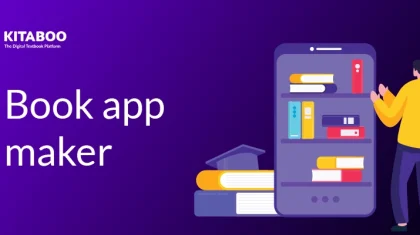
Navigating the Toolkit: Choosing the Right SDK for Your eBook Project
Summarize this blog with your favorite AI:
SDK, an acronym for Software Development Kit, is a set of tools and software/app development environments that enable swift production of the required solutions. The fact that SDKs simplify the entire production process makes them an extremely powerful implementation for the swift development of eBook projects.
Did you know that the market for SDKs (like KITABOO SDK) has been steadily growing since 2021, at a CAGR of 11.78% – estimated to reach a market value of $4.35 billion by 2027?
SDKs are particularly beneficial for eBook publishing businesses because of their capacity to drastically streamline workflows. Let’s understand the concept and benefits of eBook SDK integration.
Table of Contents
I. Benefits of SDK Integration
- Elimination of Heavy Lifting
- Full Control Over the Process
- Integrate New Revenue Streams
- Create Dynamic Products
II. Choosing The Right SDK For Your Project
III. Best Practices for SDK Implementation
IV. KITABOO: Making eBook Projects Easier With Performant SDKs
Benefits of SDK Integration
Software development kits provide digital publishing businesses with tremendous advantages. Some of the key benefits of SDK integration are:
1. Elimination of Heavy-Lifting
Integration of SDK into your eBook publishing projects offers an entire package of tools readily available for use for project development. It provides you with tools to build the frontend of web apps, CSS, end resources (like a database), and frameworks to speed up the process.
2. Full Control Over the Process
The biggest advantage of leveraging SDKs is that the code is available openly. With full visibility over the code from the get-go, it is possible to correct unwanted behavior from the start, imbuing more transparency into the development process of your eBook project. It also enables you to identify and fix bugs quickly.
3. Integrate New Revenue Streams
Using SDKs to develop your eBook projects, it is possible to integrate ad metrics measurement into the product. It helps with viewing advertising KPIs in a simplified and consolidated way, attracting partners to place their marketing opportunities with your product.
4. Create Dynamic Products
Using SDKs, it is possible to quickly roll out the latest updates or fixes for bugs throughout the release. This adaptiveness helps create a good reputation with the end users of eBooks and apps, helping you retain a good brand image in a competitive market.
Choosing The Right SDK For Your Project
If you have decided to apply SDKs for your publishing production operations, it is time to consider the factors below to select the right eBook SDK integration kit:
1. Push Notification Capability
Push notifications are an excellent way for your brand to stay at the forefront of the users’ minds. These notifications help drive traffic to the platform when there is high competition with other apps.
Being able to seamlessly integrate this feature with your eBook project can help drive good business.
2. Payment Gateways
If you have plans to offer other services and products through your eBook project, it would be an excellent decision to integrate a payment gateway into it.
This will enable more conversions by reducing the steps to checkout. An SDK with a payment gateway facility can help make all the difference.
3. A/B Testing
A/B testing is a method to find out which version of your eBook project is performing better. Having this capability in an SDK helps with releasing the best version of your app to the market. It prevents avoidable errors from making it to the end users’ devices.
4. Analytics
Best Practices for SDK Implementation
Software development kits come with a set of codes and protocols to be integrated so they can be utilized to their full potential. Listed below are some best practices you can follow to ensure a robust eBook SDK integration:
1. Permissions
Before you begin the SDK integration, list down all the permissions that it requires mandatorily and the ones that it can work without.
This information needs to be then included in a data safety form, which is utilized for information security in your product. It is important to understand the data collection behavior of your SDK beforehand.
2. Policies
You should review all the developer policies involving the collection of user data, storage, treatment, and management. If there is a clause that includes the data use of the final users, you need to include that in the Prominent Disclosure and Consent requirements in your product.
3. Store Guidelines
Your finished product is going to be hosted on device stores (like Google Play or App Store) so users can download it.
Make sure that the app features and adheres to the mandatory requirements that the stores publish (like user data consent forms, device abuse, network abuse, or ad policies).
4. Address All Alerts Immediately
In the situation where you receive an alert that your product has caused an SDK-based violation, you should address the alert immediately. You can do this by resubmitting your application by fixing the policy or guideline violation that was identified through the alert.
KITABOO: Making eBook Projects Easier With Performant SDKs
Software development kits are an excellent way to expedite the production of convenient apps like eBook readers, online reading platforms, renting and sharing eBooks, etc. Using KITABOO’s highly performant and lightweight SDK, you can build your own reader app.
KITABOO SDK focuses on functional features like standard ePUB rendering, white labeling, multimedia support, localization support, and analytics. Additionally, you also get a platform-agnostic integration capability and reader customization tools in the kit.
The fully customizable SDK by KITABOO is an extremely cost-effective and powerful way to quickly develop eBook reader apps for your brand. To understand how KITABOO can help, visit the website.
Discover how a mobile-first training platform can help your organization.
KITABOO is a cloud-based platform to create, deliver & track mobile-first interactive training content.



